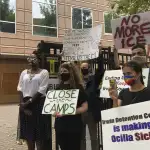A new report shows that 31 states and the District of Columbia have laws allowing permanent forced sterilizations. Little discussed and largely unmonitored, the issue grabbed national attention last summer when the pop star Britney Spears testified that she was forced to use birth control by her father. While Spears was not subject to surgical sterilization, her testimony started a conversation about reproductive rights and conservatorship.
According to the report from the National Women’s Law Center, 17 states allow the permanent, surgical sterilization of children with disabilities. The report is written in plain language, designed to be understood by at least some of the people impacted most by these laws.
The majority of people in the United States impacted by forced surgical sterilization — permanent procedures such as hysterectomies and tubal ligation — are under guardianship. Guardianship, called conservatorship in some states, is a legal arrangement designed to account for an individual’s incapacity to make legal and health decisions. The guardian, usually a family member or professional, acts as a proxy decision-maker for the person under guardianship. In many states, people under guardianship cannot refuse medical treatment or vote.
Historically, people of color were among the most impacted by forced sterilization laws, which around the turn of the 20th century were being used in eugenics movements. Even after eugenics fell into disrepute after World War II, eugenic thinking has persisted in American law. During the 1970s, the forced sterilization of Black women was so common in the American South that it was sometimes referred to as a “Mississippi appendectomy.”
While many think of forced sterilization as a relic of the past, some of the laws are quite recent: The two most recent state laws regarding forced sterilization were passed in 2019. An appendix in the report lays out the specific laws in every U.S. state and territory.
“These are very current laws,” said Ma’ayan Anafi, senior counsel for health equity and justice at the National Women’s Law Center and author of the report. “There’s still this narrative that disabled people, especially disabled people of color, are a burden on their families and to the public, that their having children is a threat to society,” they told The 19th.
The new report “advances disability justice in several critical ways” said Jasmine Harris, a professor at University of Pennsylvania’s Carey Law School and expert on disability and reproductive justice. In particular, she praised the report’s use of plain language, or writing designed to be understood by a general audience, rather than restricting information to legal experts and academics.
The National Women’s Law Center used plain language to make the information in the report accessible to at least some with intellectual disabilities.
“When people talk about forced sterilization, and are often talking as if disabled people are not there and don’t have a right to be part of the conversation,” Anafi said.
Anafi noted that this is especially true for those with intellectual disabilities.
“There’s this idea that people with [intellectual disabilities] can’t understand sex and pregnancy, so someone has to make that decision for them. But the truth is, when we give disabled people the right tools and support, more people can engage in the public conversation and make their own decisions,” they told The 19th.
To produce a plain language report, the National Women’s Law Center partnered with the Autistic Women and Nonbinary Network, a nonprofit run by and for women and nonbinary people on the spectrum. They also recruited national leaders with intellectual disabilities like Tia Nelis and Max Barrows to help review and ensure that the writing was understandable to people who aren’t policy experts.
“Lawyers can also understand plain language,” Lydia X. Z. Brown, director of policy, advocacy and external affairs at the Autistic Women and Nonbinary Network, told The 19th.
Anafi and Brown both hope that the report will empower more advocates to understand the laws in their states — and, by extension, change them.
“Bringing attention to these laws in an accessible way is step one towards a policy change,” Anafi told The 19th. “Ultimately, we want policies that ensure that everyone has the tools and supports they need to make decisions about their own bodies,” they said.







